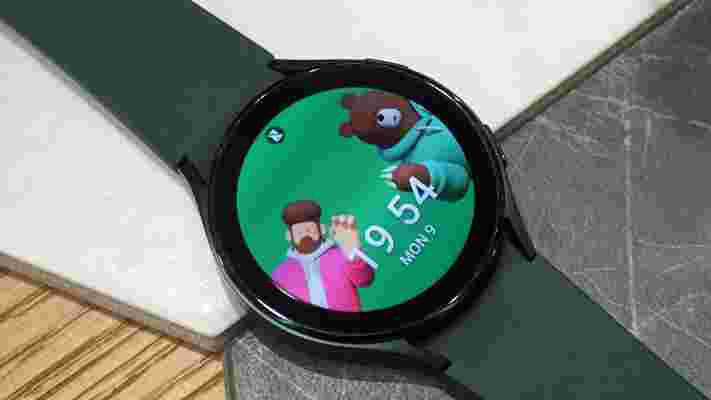Everyone has their own favorite voice assistant, and if you own a Fossil Gen 6 or buy any of the brand’s upcoming Gen 6 smartwatches such as the Skagen Falster Gen 6 or Razer x Fossil Gen 6, then you’ll soon have some say in which voice assistant gets activated on your wrist.
That’s because Fossil has confirmed that Amazon Alexa will be coming to all of its Gen 6 devices, saying in a statement to 9to5Google that “Alexa will be launching in the first half of this year on our Gen 6 devices, with opportunity to roll out on future devices. We’ll have more information closer to launch!”
So while the statement doesn’t round down the launch timing too much – with Alexa potentially arriving anytime between now and the end of June – it does confirm that the feature is on the way.
The statement also suggests that Alexa might be a feature of subsequent Fossil watches – so Gen 7 and beyond. However, from the wording, it sounds like it probably won’t come to older models, owners of which will therefore just have Google Assistant, which is a standard feature of Wear OS.
Whenever Alexa does arrive on the Fossil Gen 6 and its siblings, it’s likely to be the first of two big software updates this year, as Wear OS 3 is also known to be coming to these wearables, though recent news on that front suggests it won’t arrive until mid to late 2022 .

Analysis: more choice and better options than Samsung offers
If you bought a Samsung Galaxy Watch 4 or Samsung Galaxy Watch 4 Classic then you won’t have to wait for Wear OS 3, as they shipped with it – albeit with a Samsung skin on top. However, not only do these wearables not have Alexa, they also don’t even offer Google Assistant – which is a standard feature of Wear OS elsewhere.
What they do have, is Bixby – Samsung’s own voice assistant and one which we’d wager hardly anyone uses by choice, with Google Assistant, Alexa, and Siri all arguably being more polished options.
So if Fossil can offer the choice of two high-quality voice assistants on its wearables while Samsung only gives owners one lower quality one, then that could be a big win for Fossil, and lessen the sting of waiting so long for Wear OS 3.
Of course, Samsung could even the playing field a little. While there’s no sign of it offering Alexa on its wearables, Google Assistant is a possibility, and was even reportedly announced at one stage, but if and when it will actually land on them is very unclear.
How to watch Fight Club online: stream on Netflix and anywhere
Fight Club is just about the definition of 'cult classic', and despite a relatively poor box-office showing in 1999 and plenty of controversy surrounding its themes, the adaptation of Chuck Palahniuk's novel is beloved by rebels, outcasts, and pretty much anyone else who enjoys a good punch-up. So, square up as we explain exactly how to watch Fight Club online from anywhere.
Perfectly-cast Edward Norton stars as the unnamed Narrator, a chronic insomniac dissatisfied with his life who flits between support groups for various different ailments. After meeting Marla Singer (Helena Bonham Carter), the Narrator bumps into the charismatic Tyler Durden (Brad Pitt). They have a fight outside a bar. They like it.
From there on, the Fight Club is born, and with the help of recently passed Meat Loaf's Bob Paulson and a young Jared Leto, things go, quite predictably, a little too far. Despite the movie having one of the wildest and best-known twists in cinema, though, we won't be ruining that one – just in case.
Endlessly quotable – have you found the right time to say that you don't want to die without any scars? – and oozing toxic machismo, Fight Club is the kind of film that deserves a rewatch once in a while.
However, viewing options around the world are somewhat varied, so below we're going to outlining, region-by-region, how to watch Fight Club online anywhere in the world.
Can I watch Fight Club on Netflix?
The answer to that is yes – in some locations. If you're in the UK or Australia , then you can watch Fight Club on Netflix. However, in the US, Canada, and elsewhere in the world, Fight Club is not available on Netflix, and is hosted on a number of other streaming services.
Don't despair, though. If you've got a Netflix account and you live in the US, for example, just follow our tips below on how to watch Fight Club and plenty more on Netflix without having to take the next flight to London.
How to watch Fight Club from outside your country
If you're away from home, regional restrictions will prevent you from streaming content from your usual streaming platform – quite possibly stopping you from watching Fight Club on the streaming service you're accustomed to.
Thankfully, the solution is pretty simple. Downloading a VPN will let you change your IP address – meaning you can connect to a server based back home and watch geo-blocked content on sites like Netflix no matter where you are.
Use a VPN to watch Fight Club online from anywhere

How to watch Fight Club online in the US

How to watch Fight Club online in Canada

How to watch Fight Club online in the UK
How to watch Fight Club online in Australia
Days Gone shows sales figures have never meant success
To the surprise of many, Days Gone is newsworthy again. Not the game itself, mind, but its treatment by publisher Sony. The nearly three-year-old PS4 game, that follows a moustachioed biker across a zombie-infested America, might seem like an open-and-shut case: the game’s initial release was met with little fanfare, its critical response was positive but middling, and last year’s PC port finally presented the game in the best state it’s ever been.
A reasonable success, you might think. Nothing to rave about, but certainly one to enjoy from the backlog. It’s that success, though, that’s become something of a hot topic. Responding to a celebratory announcement earlier this week that Sucker Punch’s Ghost of Tsushima has sold more than eight million copies, Days Gone co-director Jeff Ross took the opportunity to talk about his game’s comparative treatment.
It, too, had apparently sold over eight million copies at a similar point in its post-launch run, but didn’t receive nearly the same praise from Sony. “Local studio management always made us feel like it was a big disappointment,” Ross said , emphasizing that it was the Days Gone’s sales that disappointed the higher-ups , not its review scores. Hardly the corporate slap on the back and social media adulation that Ghost of Tsushima has received from Sony
It’s a kick in the teeth to any developer to see their creation treated unfairly, but perhaps that punt in the mouth hurts a little more when it comes from your own publisher. For all the talk of artistry and auteurism in the video games industry, it’s still a commercial space that’s, notionally, supposed to reward commercial success. If a game sells well, and its creative team is still on board, you can probably expect a sequel down the line. But for Days Gone, Ross says, that wasn’t on the cards .
Games that nearly got away

For me, Ross’s reaction says less about why Days Gone was shelved than it does the relevance of sales figures full stop. Maybe Sony didn’t consider the game’s setting to have the longevity it was after, or the game didn’t lend itself to adaptation (remember, a Ghost of Tsushima movie is on the way). It’s easy to speculate about the game’s demise, but what we can say for certain is that video game sales are rarely a useful indicator of success.
I mean real success. The kind that matters. The kind that has players talking about a game years after its console generation has passed, or trying to remake and emulate it in future decades when its original tech has fallen into the ill-fated land of ‘retro’. It’s great fun to talk about the ridiculous sales figures of Grand Theft Auto 5, the world-eating commercial behemoth that is Minecraft, or the charming thought that Tetris can still hold its own against modern triple-A releases. But such figures often fail to paint the full picture.
Take Psychonauts, Tim Schafer’s much-lauded mind-jumping platformer. Now, it’s considered a cult classic that embraced the sheer silliness of its characters and absurdity of its themes in a way few 3D platformers had before. Its long-anticipated sequel , released last year, had the gaming world collectively wondering why we ever let Razputin get away for so long. The original Psychonauts’ release in 2005, though, told quite a different story. Although a darling for critics, it sold fewer than 100,000 copies and led to the resignation of its publisher’s CEO. Viewing Psychonauts from a wholly commercial angle makes it look like an embarrassing flop, but we all know that the game rocks.
Take a step back in time to 1999 and you’ll find a similar story with System Shock 2. A ground-breaking immersive sim that mixed RPG progression, expansive exploration, and narrative flavor so deftly that it’s still a joy to play today, despite its enemies looking closer to lumps of playdough than the fleshy monstrosities they’re supposed to portray. Eight years later, it served as the spiritual successor to a little-known game called BioShock, but spent most of its life boasting poor sales figures, while stuck among protracted legal wranglings surrounding its intellectual property rights.
Of course, there are also more recent releases to point to. Bioware’s exosuit-clad third-person shooter Anthem was one of the best-selling releases of 2019. But you won’t find many people playing it today, nor willing to testify their love for its exhausting grind that quickly turned off players. Cyberpunk 2077 , too, has managed to clinch record-breaking sales figures, despite the buggy controversies that riddled its launch.
There are plenty more examples too: Beyond Good & Evil, Conker’s Bad Fur Day, Ōkami , Kingdoms of Amalur. Take your pick.
Deserved reception

All of this might seem trivial. It’s not difficult to see that commercial success and critical reception don’t always align, or that popular perception might be totally different from either. Nostalgia is a powerful force, and the influence of critics tends to wane as the years pass. Games, like any other medium, are subject to the cultural zeitgeist, made for consumer trends and artistic styles that flip back and forth.
But what the discussion around Ghost of Tsushima and Days Gone does highlight, however, is that the reaction to sales figures often says more about a game than the figures themselves. Do players and management congratulate the devs on a job well done? Do they bawk at the astonishingly low sales for a standout game? Do they duly agree that it got exactly the commercial response it received? A year after a game’s release, the general consensus towards it will likely be decided. Whether the publisher, developer, or players feel the need to celebrate that consensus, and the achievements of the game’s creators, says the most about whether a title is considered a success.
For Days Gone, that consensus was one of middling acknowledgment. It didn’t receive the praise of Ghost of Tsushima, or develop the same scale of committed fanbase. Commercially, it may have deserved far more credit than it received from the suits above, but critically, not so much. After all, sales figures have never correlated with real success.